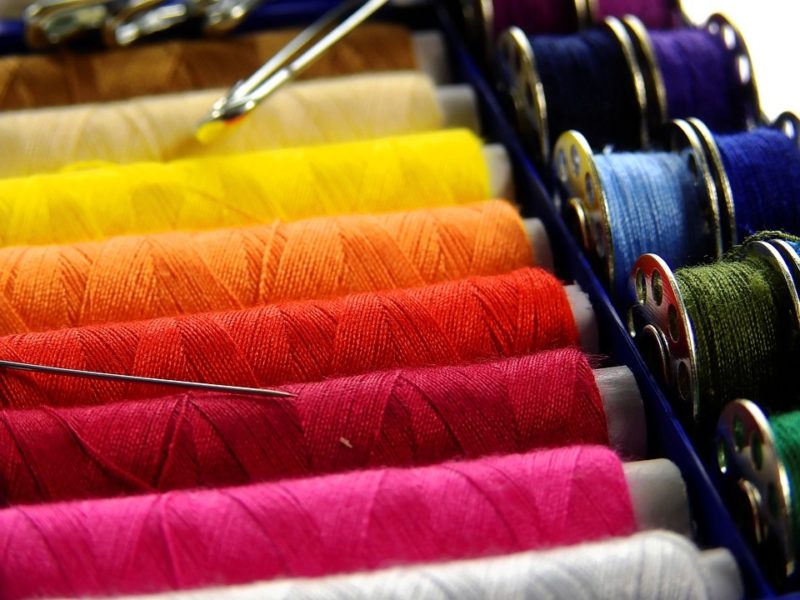To answer what is the best thread for sewing means going through the six must-haves on your sewing kit. They are cotton, polyester, nylon, rayon, silk, and wool.
We will also differentiate threads based on how they are constructed and finished. This article should be a complete buying guide for sewing threads.

Speaking of which, read what is the strongest sewing thread if you expect to work on heavy-duty projects.
What Is The Best Thread To Use For Sewing
Cotton thread
The most commonly used thread in sewing is the cotton thread, especially when working on cotton fabrics. Cotton thread is also an easy choice when quilting lightweight materials.
However, remember that cotton is among the weaker threads, so never use it when the seams will undergo stress.
Polyester thread
A stronger option than cotton thread is polyester. It is even helpful for sewing denim, leather, and woven products.
A tip when using polyester thread is to lubricate it to lessen the friction when sewing tough materials. Furthermore, expect that polyester is noticeably shinier than cotton thread.
Nylon
Another thread that you can use for leather is the nylon thread. Some are even treated to be resistant to staining and high temperatures for outdoor and sports projects.
Rayon thread
If you’re doing embroidery and decorative stitches, you’re most likely to use rayon thread. There are even types that have more luster to them, which make excellent alternatives to silk thread.
However, rayon threads are prone to leaking colors. Therefore, avoid washing rayon thread with bleach.
Silk thread
Although pricey, silk thread is among the best ones to get, especially when embroidering or sewing delicate materials. The silk’s smoothness won’t ruin light fabrics, especially when basting or doing hems and buttonholes.
You can also use silk for decorative stitching on quilts. Read how to use decorative stitches on a sewing machine if you’re interested.
Wool thread
A strong thread used for materials like canvas is the wool thread. It is even considered stronger than linen thread, and it comes in various types where the Persian woolen thread is meant for heavyweight sewing.
Wool threads are also common for needle art and embroidery. However, sewing machines can only use more delicate wool threads, so always check with your manual.
How Do I Choose A Sewing Thread?
Natural vs synthetic
Threads are either natural or synthetic, where natural threads are often used for home sewing, and synthetic threads are usually used for industrial sewing. Natural threads include cotton, wool, silk, and linen, while synthetic threads are polyester and nylon.
You can expect that heavy-duty projects require synthetic threads since they are more resistant to wear. However, sewing natural materials require natural threads, so they’ll degrade at the same rate.
Construction
Threads can also be classified based on how they are constructed. For example, spun threads are made from short fibers twisted together, which makes them useful for sewing durable seams.
For industrial sewing, you can use core-spun threads that have a filament in the center with fibers around them. This construction is what makes core-spun threads about 50% stronger and suitable for heavyweight materials like denim.
There are also filament threads, which you can distinguish as monofilament, multifilament, and bulk filament. Monofilament threads like silk are made of a single fiber, multifilament threads like nylon are multiple fibers twisted together, and bulk filament threads like polyester have their numerous threads bonded.
Finish
Finally, you can select a sewing thread based on its finish. The thread might have a flame retardant finish for sewing protective wear, or the thread has a water repellent finish for making outerwear.
There are also threads with an anti-static finish to protect from static charge. These threads will be helpful when sewing conductive materials.
How Do I Choose A Thread For My Sewing Machine?
Thickness
There are different thread thicknesses, which are interchangeable with thread weights. Therefore, when the thread is considered thick or heavy, the stitches will be more pronounced than smaller weights.
Selecting the thread thickness depends on the material and needle as well. Remember that your needle, thread, and fabric should all be compatible with each other.
Color
It’s a given that selecting a thread for the sewing machine will be influenced by the type of thread. However, you shouldn’t also overlook considering the thread color.
The thread might be the same as the fabric for invisible stitches. But, on the other hand, selecting a contrasting thread is perfect for decorative purposes.
How Do I Choose A Thread Size?
The units that classify thread sizes are weight, denier, and tex. With weight, the lower the number, the thicker the thread, and the thinner the thread, the higher the number will be.
If the threads are measured by denier, expect that those with large numbers are the heavy threads. And finally, threads measured by tex means finer threads have lower tex numbers and vice versa.
Conclusion
And that’s it! To find out what is the best thread for sewing, you have to consider the type.
Threads are made from synthetic or natural fibers and can be further classified based on their construction and finish. From there, decide on the appropriate thread size and color according to your needle and fabric.
